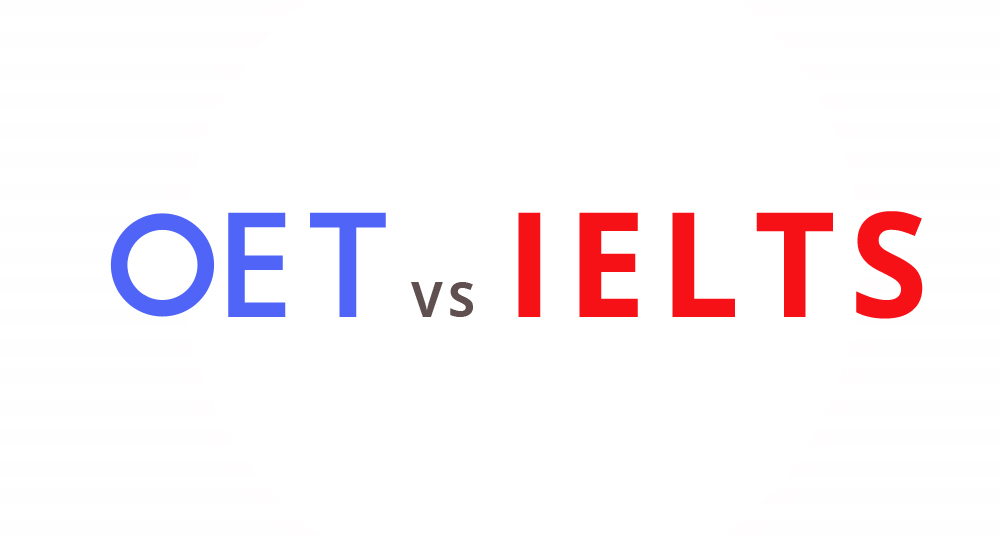Unsure whether to take the OET or IELTS? 8 Q&As to help you make your decision…


As a healthcare professional, it can be a really tough decision choosing whether to study for the OET or the IELTS programme. Both are accepted by the GMC and the NMC as a validation of your English level.
Table of Contents
Many medical professionals just don’t know which test would be more suited to them and which one they would find easier to pass.
In this article, we will discuss the differences and similarities between the two tests and help you to finally make that decision so that you can get moving and get that test passed!
IELTS and OET: Key Differences Matrix
1. Key Differences Matrix
| IELTS (International English Language Testing System) | OET (Occupational English Test) |
|---|---|
| Includes Testing of Listening, Reading, Writing & Speaking Modules | Includes Testing of Listening, Reading, Writing, & Speaking Subtests |
| Requires a Wide Range of Vocabulary esp for Reading, Writing & Speaking General and academic content from different genres | Requires a Wide Range of Vocabulary mainly in Reading Clinical & medical content in Writing & Speaking |
| Listening Module: 4 Parts Part 1 & 2 General Content (maps, brochures, leaflets, etc. ) Part 3 & 4 Academic Content (research articles, projects discussion, university lectures, etc.) | Listening Subtest: 3 Parts Part A (2 patient-led dialogues/consultations) Part B (6 short recordings- healthcare settings) Part C (presentation/interview by healthcare professional) |
| Reading Module: IELTS Academic: 3 long texts all research articles from different disciplines IELTS General: 2 sections have different short texts, 3rd section is academic text. | Reading Subtest: 3 Parts Part A (4 texts on 1 health condition/treatment) Part B (6 short texts from notices,emails, manuals, memos, guidelines in healthcare settings) Part C (2 articles published for healthcare audience) |
| Writing Module IELTS Academic Task 1: Report Writing (pie chart, graph, map, diagram, table, combination) 150 words Task 2: Essay (opinion based, cause & effect, advantages & disadvantages, two sides, two parts question, etc.) 250 words IELTS General Task 1: Letter (formal, semi formal, informal) Task 2: Essay (opinion based, cause & effect, advantages & disadvantages, two sides, two parts question, etc.) 250 words | Writing Subtest 1 Healthcare profession specific letter (180-200 approx word) using casenotes ★ Referral letter ★ Information/ Update letter ★ Discharge letter ★ Transfer letter |
| More Emphasis on Language (Writing Module) Grammatical Accuracy 25% of the total weightage Lexical Resource 25% of the total weightage | Less Emphasis on Language (Writing Subtest) 1 criterion out of 6 for weightage in marking ➔ Purpose ➔ Content ➔ Conciseness & Clarity ➔ Genre & Style ➔ Organization & layout ➔ Language |
| Speaking Module: (3 parts) Part 1: general introduction questions Part 2: long turn speaking task (2 mins) with 1 minute preparation time Part 3: detailed questions involving opinions, critical thinking, complex structures, etc. The examiner will conduct the speaking module. | Speaking Subtest: 2 Simulated profession specific tasks Task: Role play between healthcare professional and doctor with 3 mins preparation time.The interlocutor is not the examiner. The interlocutor is the patient in the roleplay. |
| Overall interaction & communication Focused across a range of discourses (Speaking Module) Marking Criteria: | More Emphasis on Communication with patients (Speaking Subtest) Communication Criteria |
| Global recognition ● More than 11000 organizations in approximately 140 countries. ● Immigration (IELTS General) ● professional bodies, (IELTS general/academic) ● Life skills IELTS (Spouse visa, extension of visa, basic proficiency, etc.) ● IELTS Academic (academic institutions for study visa) | Recognition by Medical Boards across the globe ● More than 200 healthcare organizations including NMC, GMC, ECFMG, CGFNS, FMRAC, AHPRA, NCNZ, and NCNZ in more than 200 countries including Canada, Egypt, India, Ireland, Maldives, New Zealand, Philippines, Qatar, Spain, United Kingdom, and the United States of America. 12 Healthcare professions: ● Nursing ● Medicine ● Dentistry ● Pharmacy ● Physiotherapy ● Occupational Therapy ● Radiography ● Dietetics ● Optometry ● Veterinary Science ● Speech Pathology ● Podiatry |
| Improve overall English proficiency Enhanced overall communication skills | Improve English genre specific proficiency Improves clinical communication skills |
2. Similarities Between OET & IELTS
Both the OET test and the IELTs tests have a similar format that would be found in most language tests.
They are divided into four subsections-writing, reading, listening and speaking. Your level of English is assessed in each of these areas. The scores from each of the areas are then combined and you are given a final grade.
3. Content & Situations
The IELTS test is not tailored to medical professionals so the content of the language tasks will be on all sorts of different themes. These may be current affairs, social issues, opinions, hobbies or a variety of situations that you may encounter in your life in an English-speaking country.
The content of the OET, however, is based around situations that would occur in your specific medical field, be that nursing, medicine, pharmacy, physiotherapy, dentistry etc. The elements of language that you will be studying will be those related to your medical profession and those that would be used in a work-place context.
4. Cost & Test Dates for OET & IELTS
As the OET tests are more targeted and focussed towards particular professions, they are a little more expensive (US$ 455) than the IELTS tests (between US$ 280-340) which have a more general curriculum.
Similarly, there will be more IELTS test dates over the year as a large number of people take these exams for various purposes. However, the available test dates for the OET are sufficiently flexible, including options for paper-based OET test, computer-based OET test, and OET@Home, allowing you to plan accordingly.
5. Preparation Time
When learning anything new, preparation is key. Both tests will require planning, preparation, revision and practice. Some of this learning will be similar in terms of general English language skills.
On the plus side for IELTS, there are more study resources available. However, due to the generalised nature of the tests, the resources are very broad, and putting in the groundwork can take quite a long time.
Regarding OET preparation, there are less resources available, but they tend to be very focussed towards the prerequisites of the tasks. The quality of study materials is high, and preparation for the tests can take less time since healthcare professionals are already familiar with most of the OET vocabulary and contexts.
6. Test Acceptance
OET is likely to be accepted by medical institutions in which you would be looking for work.
IELTS is accepted more generally but OET may be preferred by your institution.
7. Retaking Test
Students often retake English tests before they gain the required grades. The rules about retaking the tests are different for IELTS and OET. It’s important to have an understanding about how both of their systems work in this situation.
With the IELTS tests, it is necessary to take one skill retake (OSR) within 60 days of the test once per original test.
With the OET test, however, you may take one or more subtests after first time full OET test booking if you have not achieved the required score/grade in any subtests.
Evidently, this is an area where taking the OET tests would be favourable.
Please note that there are some boards and institutions that specify that all the skills for the OET are passed in the same sitting so it is worth checking the relevant website for this information before you make any decisions. Also, OET@Home and OET on Computer are not available for one subtest retake till date.
8. Difficulty Level
Well, I won’t spend too much time answering this one because, despite their differences, they are both testing your English level, and which test you find easier really depends on your own strengths and weaknesses and ultimately, which test is more suited to you.
Obviously, the OET would be really difficult if you were not a trained medical professional but the IELTS may be harder if you are more comfortable with the English used in your professional field. Rather than determining which test is easier, it would make more sense to decide which is more suited to you, and only you can do that!
9. Conclusion
So, switching from IELTS to OET or vice-versa due to frustration over trying to pass the tests or the possibility that a different test may be easier is an option that some consider. If you are at a fairly early stage in the learning process and you feel that after researching the two tests, you would like to switch, this may be a good idea.
However, as a general rule it makes sense to stay with one or the other as some of your preparation would be wasted, costs need to be taken into account and ultimately, it may be that your English skills just need some more practice to get you to the desired level.
Free Writing OET Materials
1. OET Writing Materials for Nurses
2. OET Writing Materials For Doctors
10. Advice
After outlining all the key differences and similarities in the OET and IELTS tests—such as format, content, fees, testing criteria, types of questions, global recognition, benefits, and shortcomings—we would like to offer sincere advice to our valued healthcare candidates aiming to practice in English-speaking countries.
We encourage you to try both tests and then invest in the one you feel most confident with. With Edubenchmark , you can take mock tests for OET (Listening, Reading, Writing, Speaking) to familiarize yourself with the format and content along with the feedback of our competent assessors. For IELTS, you can get a correction service for writing and feedback on speaking from our expert examiners.
This approach will help you make an informed decision about which test best suits your needs and boosts your confidence for success.














